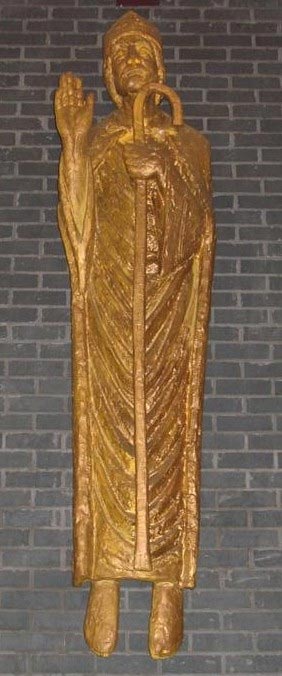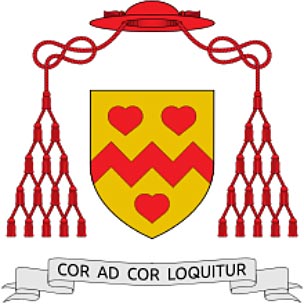SAINT WULSTAN
Born 1008, died 1095. Canonized 1203
 Wulstan was a native of Long Itchington in Warwickshire. He studied in the monasteries at Evesham and Peterborough. Brihtheah, Bishop of Worcester, guided his preparation for the priesthood.
Wulstan was a native of Long Itchington in Warwickshire. He studied in the monasteries at Evesham and Peterborough. Brihtheah, Bishop of Worcester, guided his preparation for the priesthood.
St Wulstan, having been distracted while celebrating Mass by the smell of meat roasting in the kitchen, vowed never to eat it again. He became a novice in the Benedictine Monastery of Worcester where he was noted for his innocence and sanctity. His first work was that of instructing children and he then became precentor and the church treasurer. He continued to devote himself to prayer and spent whole nights in the church.
Despite his strenuous resistance, he was made prior of Worcester and in 1062, Bishop of that diocese. Though not very learned, he delivered the Word of God so impressively and with such emotion as to move some of his audience to tears. He was closely involved in the suppression of a trade by which men were kidnapped into slavery and shipped from Bristol to Ireland. He always recited the psalter while he travelled and never passed a church or chapel without going in to pray before the altar.
In 1066 William the Conqueror became king of England and appointed Norman bishops to most English bishoprics. But he came to recognise Wulstan’s qualities and treated him with respect and trust. Even the Norman Archbishop of Canterbury, Lanfranc, commissioned him to make the visitation of the diocese of Chester as his deputy. When the English complained of the oppression of Norman rules, Wulstan told them it was a scourge of God for sin and must be borne with patience. Young gentlemen brought up under his care were taught to carry in dishes and to wait at table to teach them the true spirit of humility.
Wycombe was, at that time, in the diocese of Lincoln, but Sweartling, the man responsible for the building of All Saints’ Church, wanted Bishop Wulstan to consecrate it because of his reputation for holiness. The Bishop of Lincoln readily granted this permission. St. Wulstan not only consecrated the Church of All Saints but also administered confirmation and cured a maidservant suffering from a serious mental disturbance. He sprinkled her with the water used to bless the church and she recovered immediately. There is still a statue in the church of All Saints in High Wycombe to this day. On a previous visit to Wycombe Wulstan had stayed in an old inn, which began to creak and groan as he was preparing for his morning departure. The terrified servants rushed outside and shouted to the Bishop to save himself. He rebuked them for their lukewarm faith and refused to leave until his baggage had been loaded on to the packhorses. As soon as he had left the inn, the entire building collapsed. William of Malmesbury, the famous chronicler who tells us this delightful story, says that the building delayed its own collapse because of Wulstan’s holiness.
Bishop Wulstan rebuilt his own Cathedral at Worcester in 1086 but he loved the old building, which had had to be demolished. “The men of old” he said, “if they did not have stately buildings, were themselves a sacrifice to God, whereas we pile up stones and neglect souls.
He died on 19th January 1095 and he was canonised in 1203 by Pope Innocent III. His feast is celebrated on the 19 January.

